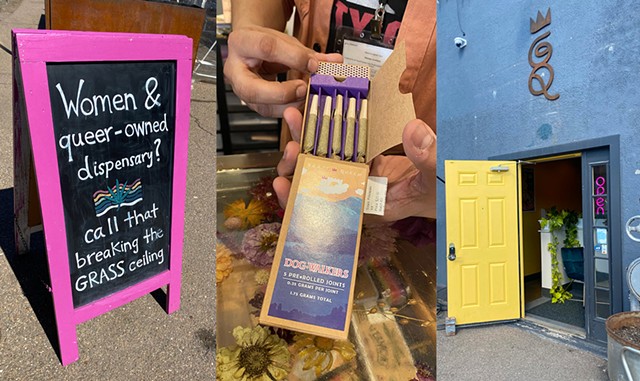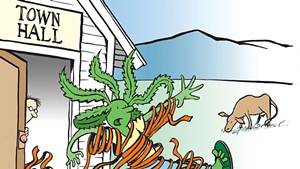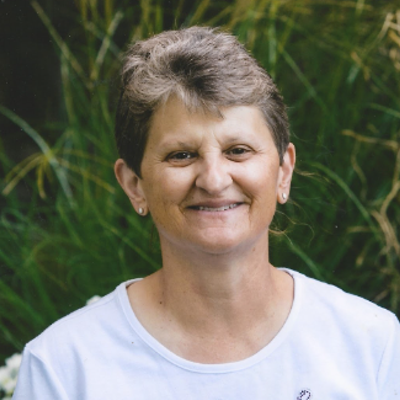
- File: Sasha Goldstein ©️ Seven Days
- Grass Queen cannabis in Burlington
Grass Queen, a small shop on South Union Street, will close on October 28, according to owner Jahala Dudley. It's one of 13 licensed weed stores in Burlington; two more have submitted applications.
That competition and other costs, including for licensing, make it impossible to stay afloat in what Dudley called the state's "pay-to-play system."
"Vermont’s legal industry is new and continues to evolve," she wrote in a statement announcing the closure. "But a prohibitive $10,000 annual renewal fee ensures that Grass Queen cannot be financially viable. Grass Queen is not in a position to sell products at a loss in order to 'out-compete' the other license holders in this city."
In an interview, Dudley said she'd set out to create a place where women and members of the LGBTQ community felt comfortable buying cannabis. Pulling the plug was a difficult decision, she said, "especially thinking about all of the customers."
Her announcement comes two years to the day after Vermont's first legal cannabis shops opened. Today 89 licensed retailers are operating, and several more have applied for licenses. Grass Queen would be only the third to close, according to data from the Vermont Cannabis Control Board, which regulates the industry.
In an interview, Dudley said she'd set out to create a place where women and members of the LGBTQ community felt comfortable buying cannabis. Pulling the plug was a difficult decision, she said, "especially thinking about all of the customers."
"I am pretty devastated for them, but I simply can't afford to keep losing money to wait until the competitors spin out," Dudley said.
Grass Queen opened in February 2023 and once employed as many as 10 people. But Dudley said she had to reduce the number of staffers as the business suffered. Her remaining workers have found new jobs, she said.
Dudley has a grow operation in Plainfield that she plans to keep running, she said.
"Everything's more expensive when you're operating a cannabis business; you know that going in," Dudley said. But, she added, "living paycheck to paycheck in a new, exciting cannabis industry as a sixth-generation Vermonter — [It] just doesn't feel like this market's working for me right now."
Grass Queen opened in February 2023 and once employed as many as 10 people. But Dudley said she had to reduce the number of staffers as the business suffered. Her remaining workers have found new jobs, she said.
Dudley has a grow operation in Plainfield that she plans to keep running, she said.
"Everything's more expensive when you're operating a cannabis business; you know that going in," Dudley said. But, she added, "living paycheck to paycheck in a new, exciting cannabis industry as a sixth-generation Vermonter — [It] just doesn't feel like this market's working for me right now."
The rapid proliferation of stores, and where they are located, prompted the board to vote last week to stop accepting new license applications for cannabis stores. James Pepper, chair of the control board, noted that some municipalities haven't "opted-in" to the market, meaning stores can't open there. That, and a lack of a customer base in more rural areas, has concentrated stores in certain places.
Related Burlington’s Cannabis Marketplace Is Quickly Becoming Crowded

Burlington’s Cannabis Marketplace Is Quickly Becoming Crowded
Business
During its most recent session, the Vermont legislature gave the control board the authority to create "location or siting requirements that increase the geographic distribution of new cannabis retail establishments based on population and market needs." To do that, the regulators need to pause new retail license applications and come up with rules, according Pepper.
The process could take several months. But, Pepper said, the board is interested in exploring ways to make smaller stores more financially viable in rural areas that don't have nearby access to legal cannabis. For example, he said, the board could potentially create rules that would allow a general store to sell cannabis, for a smaller fee, rather than forcing a retailer to open a standalone shop.
The application closure begins on October 25, but those who have already begun the process have until November 15 to get licensed.
"This truly is a pause while we write our rules," Pepper said in an interview. "Once we get a little bit more geographic distribution, maybe we'll open things back up statewide."
The regulators also voted to stop accepting applications for "Tier 2" growing licenses, which allow people to cultivate up to 2,500 square feet of cannabis canopy. The decision means every larger tier is now closed and people can only apply for the smallest tier, which allows them to grow up to 1,000 square feet of cannabis canopy.














Comments
Comments are closed.
From 2014-2020, Seven Days allowed readers to comment on all stories posted on our website. While we've appreciated the suggestions and insights, right now Seven Days is prioritizing our core mission — producing high-quality, responsible local journalism — over moderating online debates between readers.
To criticize, correct or praise our reporting, please send us a letter to the editor or send us a tip. We’ll check it out and report the results.
Online comments may return when we have better tech tools for managing them. Thanks for reading.